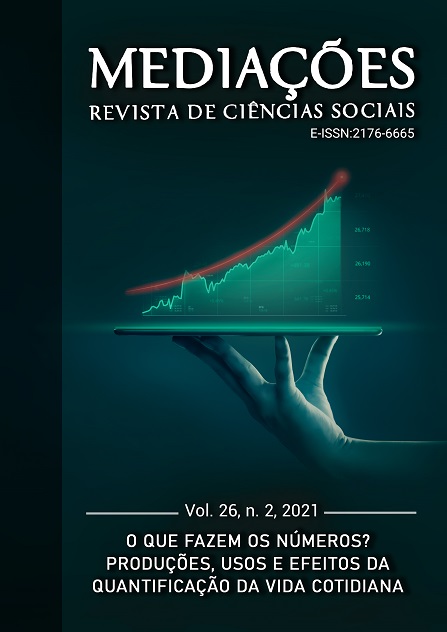Narcissistic authoritarianism and deceptive articulation in Bolsonaro’s case. (necessary) distinctions among populism and capitalist discourse
DOI:
https://doi.org/10.5433/2176-6665.2021v26n2p362Keywords:
Capitalist discourse, Populism, Articulation, Authoritatianism, BolsonaroAbstract
In this paper we set up that Bolsonaro’s case analysis as a right-wing populism does not take into account an underlying subjective dynamic which implies contemporary structural ideological transformations. By analysing a spot from his electoral campaign, we consider that the collective phenomenon around Bolsonaro its symptomatic of a new political form, authoritarian and narcissistic, that can be rendered intelligible with the notion of Capitalist Discourse, set by Jacques Lacan. Within this theoretical composition, we conclude that, in Bolsonaro’s case, rather than a populist experience, we can find a deceptive articulation, where a radical repression of the social difference is produced along with a command to enjoy that seals the subject.Downloads
References
AMADO, Adriana. Los influencers de Bolsonaro. Anfibia, San martin, 2019. Disponible en: http://revistaanfibia.com/ensayo/los-influencers-bolsonaro/.
BORÓN, Atilio. Bolsonaro y el fascismo. Pagina 12, Ciudad Autonoma de Buenos Aires, 1 jan. 2019. Disponible en: https://www.pagina12.com.ar/165570-bolsonaro-y-el-fascismo.
DIPAOLA, Esteban; LUTEREAU, Luciano. El discurso capitalista y el goce de lo que se consuma: Lacan y la cultura contemporánea. Diferencias. Revista de teoría social contemporánea, Buenos Aires, v.1, n. 1, p. 19-39, 2015.
IGNAZI, Piero. Extreme right parties in Western Europe. Oxford: Oxford University Press, 2003. Disponible en: https://doi.org/10.1093/0198293259.001.0001.
KALTWASSER, Cristobal Rovira et al (orgs.). The Oxford handbook of populism. Oxford University Press. Oxford, 2017.
LACAN, Jacques. Escritos 2. México: Siglo XXI, 2009.
LACAN, Jacques. El Seminario, libro 23: El Sinthome. Buenos Aires: Paidós, 2012.
LACLAU, Ernesto. La razón populista. Buenos Aires: Fondo de Cultura Económica, 2008.
LACLAU, Ernesto. Los fundamentos retóricos de la sociedad. Buenos Aires: Fondo de Cultura Económica, 2014.
LACLAU, Ernesto; MOUFFE, Chantal. Hegemonía y estrategia socialista: hacia una radicalización de la democracia. Buenos Aires: Fondo de Cultura Económica, 2004.
MCGOWAN, Todd. The psychosis of freedom: law in modernity. In: MILLS, Jon; DOWNING, David L. (eds.). Lacan on Psychosis. London: Routledge, 2018.
MENDONÇA, Daniel de.; MACHADO, Igor Suzano. O Populismo e a Construção Política do Povo. Mediações, v. 26, n. 1, p. 10-27, 2021.
MUDDE, Cas. Populist radical right parties in Europe. Cambridge: University Press, Cambridge, 2007.
OLIVEIRA, Joana; ROSSI, Marina. WhatsApp, el elemento distorsionador de la campaña en Brasil. El País, 7 oct. 2018. Disponible en: https://elpais.com/internacional/2018/10/07/america/1538877922_089599.html.
PANIZZA, Francisco. El populismo como espejo de la democracia. Buenos Aires: Fondo de Cultura Económica, 2009.
SOLER, Colette. Discurso capitalista. In: PASCUAL MAZA, Clotilde. Los discursos de Lacan. Madrid: Colegio de psicoanálisis de Madrid, 2007.
TORRES, Jorge Foa; REYNARES, Juan Manuel. La condición neoliberal del nuevo autoritarismo narcisista, o por qué Bolsonaro no será nunca populista. In: PIÑEIRO, M. Teresa; TORRES Jorge Foa. (coord.). Neoliberalismo: aproximaciones a las razones de su éxito. Córdoba: Centro de Estudios Avanzados, 2019.
TORRES, Jorge Foa; REYNARES, Juan Manuel. La emergencia de la subjetividad troll en la época del Discurso Capitalista. Anacronismo e Irrupción, Ciudad Autónoma de Buenos Aires, v. 10, n. 18, p. 280-306, mayo/oct., 2020.
Downloads
Published
How to Cite
Issue
Section
License
Copyright (c) 2021 Jorge Gabriel Foa Torres, Juan Manuel Reynares

This work is licensed under a Creative Commons Attribution 4.0 International License.
Copyright on articles published in Mediações belongs to the author(s): in the case of partial or entire republication of the original publication, we ask author(s) to indicate the original publication in the periodical.
Mediações uses the Creative Commons Attribution 4.0 International license, which allows Open Access, enabling any user to read, download, copy and disseminate its content so long as adequately referenced.
The opinions expressed by the author(s) are their sole responsibility.
































